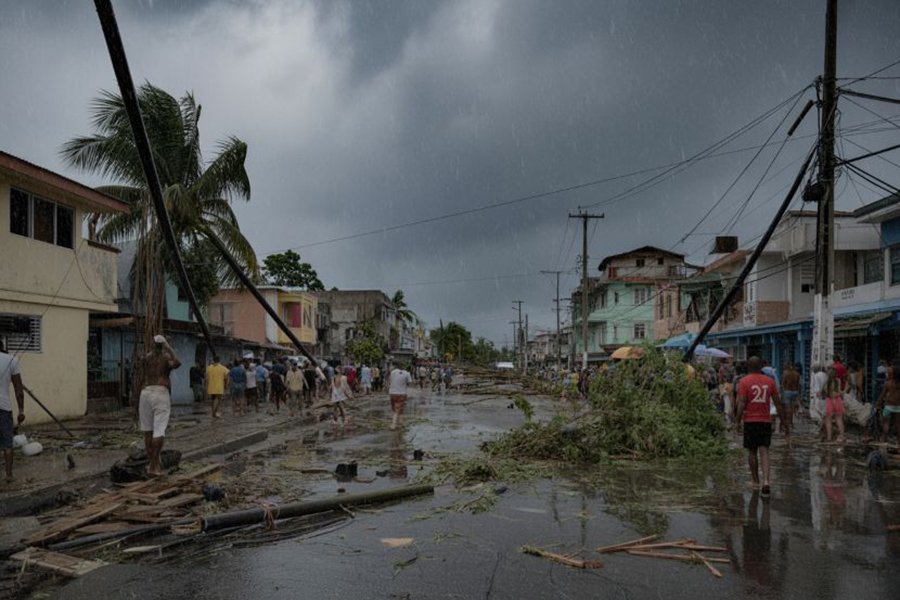read also
Jamaica in the Eye of Hurricane Melissa: The Island Devastated, Thousands of British Tourists Stranded Without Communication

Photo: Travel and Tour World
Jamaica has found itself at the center of one of the most devastating hurricanes in recent years,reports Travel and Tour World. Hurricane Melissa, with winds reaching 295 km/h, hit the island’s southwest coast, leaving hundreds of thousands of people without electricity or communication. Airports have been shut down, transport between regions disrupted, and around eight thousand British tourists remain trapped in hotels, unable to leave the country.
A Storm Without Mercy
The hurricane brought destruction that local authorities describe as unprecedented. Homes and bridges were washed away by torrents of water, roads were blocked by fallen trees and debris, and entire communities were cut off from the rest of the island. In some cities, water rose above window level, and hospitals switched to backup generators. Meteorologists recorded wind speeds of up to 185 mph — placing Melissa among the most powerful hurricanes in the history of the Caribbean.
A state of emergency has been declared on the island. Power lines have been knocked down, mobile towers damaged, and banking systems and the internet operate intermittently. Police and soldiers are patrolling tourist zones to prevent panic-driven attempts to flee unsafe areas.
The tourism industry, which accounts for a third of Jamaica’s GDP, has nearly come to a standstill. Dozens of resorts are closed, excursions suspended, and new bookings cancelled. The coastal resort areas that took the full force of the storm suffered the greatest losses — hotels, restaurants, and infrastructure have been destroyed. Tour operators such as TUI, Virgin, and British Airways have temporarily halted flights and are offering customers rebooking options.
For business travelers, the situation is no less serious. Conferences, meetings, and corporate events have been cancelled, while companies operating on the island have temporarily suspended their activities. Disruptions in transport and energy supply have paralyzed logistics. Economists already describe the hurricane’s impact as the worst in decades: recovery, according to estimates, will take from several weeks to several months.
Instructions for Travelers
Tourists are being urged to strictly follow official guidance. The FCDO reminds travelers of key safety rules:
stay inside solid buildings, preferably in interior rooms without windows;
avoid areas with trees, weak structures, and power lines;
do not leave shelter until authorities declare the threat over.
If a hotel has been damaged, it is recommended to seek refuge in officially designated shelters. Tourists should keep identification documents, water, a flashlight, food supplies, and cash on hand — ATMs and electronic payment systems are temporarily down. Special attention is paid to communication: travelers are advised to conserve phone batteries and rely only on verified information sources, avoiding rumors on social media. Consular services and tour operators remain the main coordination channels.
Temporary reception centers have been set up in some regions, providing food, medical assistance, and charging stations. Jamaican and British authorities are coordinating the delivery of humanitarian aid and preparing for organized evacuation. The primary focus remains the safety of foreign nationals and maintaining order in tourist areas.
After the Hurricane: Losses and Outlook
As of October 31, the situation in Jamaica remains severe. According to Reuters, at least 19 people have been confirmed dead on the island, while the total death toll across the Caribbean has risen to nearly fifty. More than 25 000 people have been temporarily housed in evacuation centers, and tens of thousands remain isolated due to collapsed roads and bridges. Power outages have reached 77%, and many areas are still without electricity.
Rescue services report that the southwestern parishes of Saint Elizabeth, Westmoreland, and Manchester suffered the most damage. Some settlements remain without access to drinking water, and food deliveries are possible only by air. AP News writes that heavy rains continue even after the hurricane’s departure, posing risks of renewed flooding and landslides, especially in mountainous regions.
The Jamaican government has declared that its immediate priority is to restore transportation routes and power lines. The port of Kingston has already received the first shipment of humanitarian aid, including medicine and water-purification equipment. International organizations are sending engineers and volunteers to help rebuild hospitals, schools, and water systems. The Guardian notes that Kingston and Montego Bay airports are now receiving only cargo and humanitarian flights — regular tourist services have not yet resumed.
Experts warn that full recovery could take months. In some areas, up to 80% of homes have been destroyed, and total damage is estimated at hundreds of millions of dollars. For the tourism industry, which generates about one-third of the country’s GDP, this means a prolonged downturn and the need to rethink safety standards. According to climatologists, Hurricane Melissa has become one of the most destructive examples of the growing intensity of Atlantic tropical storms linked to ocean warming.








